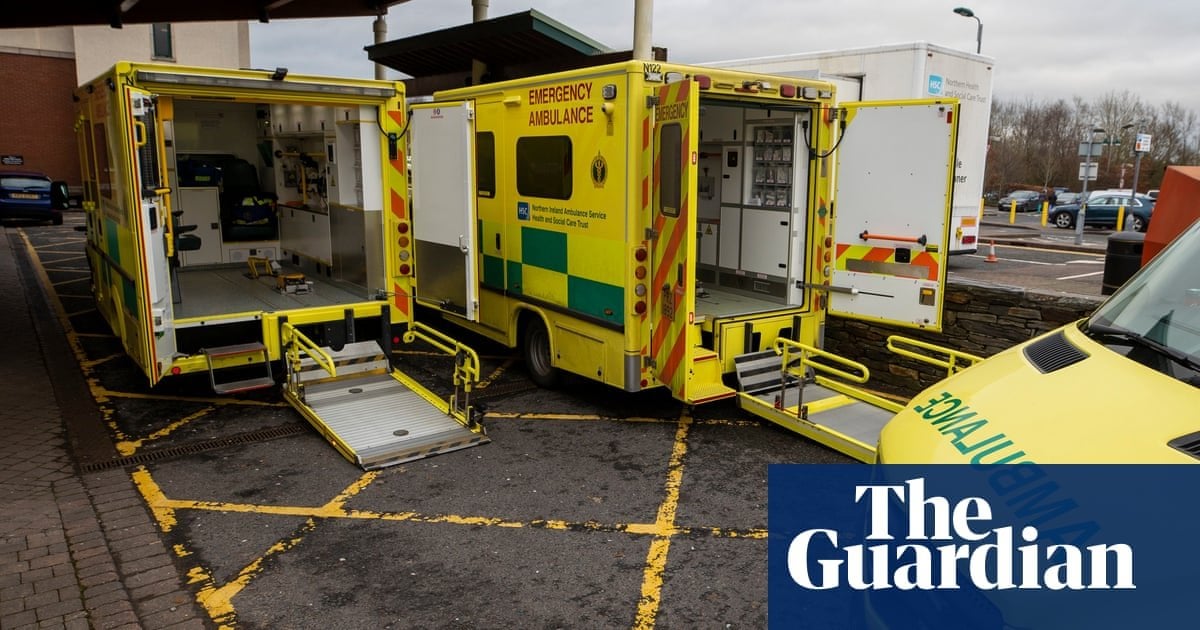
Skip to main contentSkip to navigationSkip to navigation
My account
UK
The Guardian – Back to homeThe Guardian
News
Opinion
Sport
Culture
Lifestyle
Show more
Search input
Search the Guardian
google-searchSearch
Support us
Print subscriptions
Search jobs
Hire with Guardian Jobs
Holidays
Live events
About Us
Digital Archive
Guardian Print Shop
Patrons
Guardian Licensing
The Guardian app
Video
Podcasts
Pictures
Newsletters
Today's paper
Inside the Guardian
The Observer
Guardian Weekly
Crosswords
Wordiply
Corrections
UK
UK politics
Education
Media
Society
Law
Scotland
Wales
Northern Ireland
Ambulances at the entrance to Causeway Hospital's accident and emergency department in Coleraine, Northern Ireland
View image in fullscreen
Northern Ireland
Northern Ireland’s public services ‘at risk of collapse’
Hospital waiting lists among worst in UK and children with special needs waiting a year for support, report finds
Lisa O'Carroll in Dublin
Mon 7 Apr 2025 05.00 BST
Share
Northern Ireland’s public services, including hospitals, schools and police, are being “crippled” by lack of funding, impinging on the quality of life for many people, a report by a government committee has concluded.
The Northern Ireland select committee found patients waiting more than 12 hours to be seen in accident and emergency departments and mental health needs 40% greater than anywhere else in the UK. Hospital waiting lists are among the worst in the country.
Its investigation was also told that Northern Ireland “recently held the world record for prescribing the most anti-depressants per head of population”. It also found that children with special needs were waiting more than a year for support.
The budget for the Northern Ireland Police Service has been static since 2010, despite the special challenges it faces including cross-community recruitment and efforts to stamp out paramilitarism, one of the last vestiges of the Troubles.
One witness, the Law Society of Northern Ireland, said public services were “at risk of collapse”.
The former MP Stephen Farry, a co-director of Ulster University’s strategic policy unit, told the committee it was vital that the political classes in London understood just how bad public services were in NI compared with Great Britain.
He said: “The sheer scale of the crisis is that much greater.”
The committee chair, Tonia Antoniazzi, said: “The crisis afflicting public services in Northern Ireland has gone on for far too long with the crippling effects of underfunding impinging on the day to day lives of people across communities. The current hand to mouth approach when it comes to funding has often been too little, too late.”
The committee is calling on the government to ensure funding for the next fiscal year 2026 to 2027 is “according to NI’s level of need”.
Northern Ireland has the highest public spending per person in the UK, but raises the least revenue per person, the report found. It relies predominantly on what is known as a “block grant” allocated to the devolved administrations of Scotland, Wales and Northern Ireland.
According to the so-called Barnett formula used to calculate funding, each nation receives the same pound for pound rise in funding per capita as the national funding. So, for example, if education in England is £100 a head, devolved governments must also get that level of finance.
In recognition of the dire state of Northern Ireland’s public services, the previous government raised funding to give NI’s public sector £124 a head.
The committee noted that research was being conducted to see if that needed to be raised again.
“During our predecessor committee’s inquiry in 2023–24, it heard that the funding and delivery of public services in Northern Ireland were under enormous pressure. One year on, little appears to have changed,” it said.
When power-sharing resumed in 2024 after a 24-month hiatus, the government provided a £3.3bn package, but as part of the settlement the Stormont government was encouraged to raise more revenue itself for public services.
The committee’s investigation found that this has proved to be “politically difficult” with few options open to the devolved government.
Explore more on these topics
Northern Ireland
Hospitals
Schools
Police
news
Share
Reuse this content
Most viewed
UKUK politicsEducationMediaSocietyLawScotlandWalesNorthern Ireland
News
Opinion
Sport
Culture
Lifestyle
Original reporting and incisive analysis, direct from the Guardian every morning
Sign up for our email
About us
Help
Complaints & corrections
SecureDrop
Work for us
Privacy policy
Cookie policy
Terms & conditions
Contact us
All topics
All writers
Modern Slavery Act
Tax strategy
Digital newspaper archive
Facebook
YouTube
Instagram
LinkedIn
Newsletters
Advertise with us
Guardian Labs
Search jobs
Patrons
Back to top
© 2025 Guardian News & Media Limited or its affiliated companies. All rights reserved. (dcr)
by white1984
2 comments
I’m glad the article mentioned revenue raising.
We can’t keep expecting Westminster to bail us out whenever there are so many options on the table to raise more money here which have not been explored.
🌎👨🚀🔫👨🚀
Comments are closed.